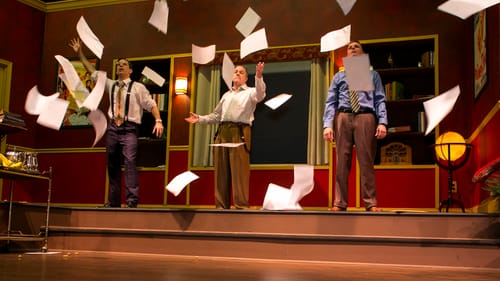Stay in the Loop
BSR publishes on a weekly schedule, with an email newsletter every Wednesday and Thursday morning. There’s no paywall, and subscribing is always free.
Blowin' in the wind
Eagle Theatre presents Ron Hutchinson's 'Moonlight and Magnolias'

There was a time when every American knew Margaret Mitchell’s 1936 novel Gone with the Wind. Though Ron Hutchinson’s 2004 play Moonlight and Magnolias missed that period by several decades, the tumultuous story of the 1,037-page tome’s adaptation into a nearly four-hour 1939 film proves stageworthy in the Eagle Theatre’s handsome production.
Hutchinson’s biggest misstep is his fictionalized history’s benign title, taken from the novel’s first line. It’s a gross mischaracterization of the play’s raucous struggle between panicked producer David O. Selznick (Damon Bonetti), acerbic script doctor Ben Hecht (Bruce Graham), and mercurial director Victor Fleming (Ernie Jewell). After Selznick fires director George Cukor and jettisons Sidney Howard’s unwieldy screenplay three weeks into shooting, the trio has to hash out a new script.
“Everybody in the world has read the book,” Selznick complains to Hecht, who hasn’t.
“You’re a son-of-a-bitch bastard,” Selznick tells him, “but a talented one.” So he and Fleming act out the book’s convoluted story while Hecht types furiously and complains about a story that asks the audience to “root for slave owners.”
Serious farce
Hutchinson goes in two directions at once. There’s farce, as the team subsists on bananas and peanuts in a hilariously staged montage that makes a splendid mess of Jewell’s luxurious office set. There’s also serious social drama, as Hecht struggles to awaken Selznick’s ideals and Jewish identity in order to make Gone with the Wind.
Hecht believes the story is not the melodrama Selznick insists it is, but rather, a statement about discrimination in America. Director Ted Wioncek III’s production successfully navigates this tricky terrain.
Graham is fascinating as Hecht, the voice of reason (by today’s standards) when he warns about America’s distrust of Jews, but ironically clueless when he repeatedly predicts Gone with the Wind’s failure. “This movie is going to derail the careers of everyone who works on it,” he insists. The audience knows — or at least those of us old enough to remember our parents gushing about the movie know — it was a huge success, earning 10 Academy Awards, including Best Picture, Best Director, Best Screenplay (credited to Howard), and the first Oscar for an African American, Hattie McDaniel as Best Supporting Actress.

Bonetti’s Selznick emits boundless creative energy in constant turmoil with utter dread, dancing around the room clutching a tattered copy of the huge novel. His boss is producer Louis B. Mayer, who is also his father-in-law; failure is not an option. Jewell’s Fleming — called away from another historically notable picture, The Wizard of Oz, to rescue Gone with the Wind — matches Graham and Bonetti in energetic commitment.
Hutchinson script also includes Selznick’s long-suffering secretary Miss Poppenghul, played by Hanna Gaffney in a broadly comic manner that undercuts the play’s serious themes and sense of reality. It’s as if no one quite knows what to make of this character; if she’s meant to show that women were relegated to menial work in the film industry, point made. She humorously repeats “Yes, Mr. Selznick” and “No, Mr. Selznick,” with nary a word or moment to call her own.
La la la la Hollywood
Eagle Theatre ultimately tilts Moonlight and Magnolias toward feel-good fun, veering past references to the war brewing in Europe. The company also adds some exposition with inventive period lobby displays as well as projections of authentic film clips on the walls and ceiling. An adjacent wine bar adds to the comic mindset, even during Sunday’s matinee.
I was entertained watching the three men roleplay the famous birthing scene and puzzle out the then-controversial, now-iconic quip, “Frankly, my dear, I don’t give a damn.” I was also open to more about Hecht’s efforts to awaken Selznick’s conscience. “A handful of Jews gave the world the movies,” he notes, “but you’re afraid they’ll take it all away.”
Selznick gets the last word, explaining that only successful movies have a chance of changing our culture: “Got any other way you live forever?” His will to see Gone with the Wind succeed gives Moonlight and Magnolias unexpected heft.
What, When, Where
Moonlight and Magnolias. By Ron Hutchinson, Ted Wioncek III directed. Through April 29, 2018, at the Eagle Theatre, 208 Vine Street, Hammonton, New Jersey. (609) 704-5012 or eagletheatre.org.
Sign up for our newsletter
All of the week's new articles, all in one place. Sign up for the free weekly BSR newsletters, and don't miss a conversation.

 Mark Cofta
Mark Cofta